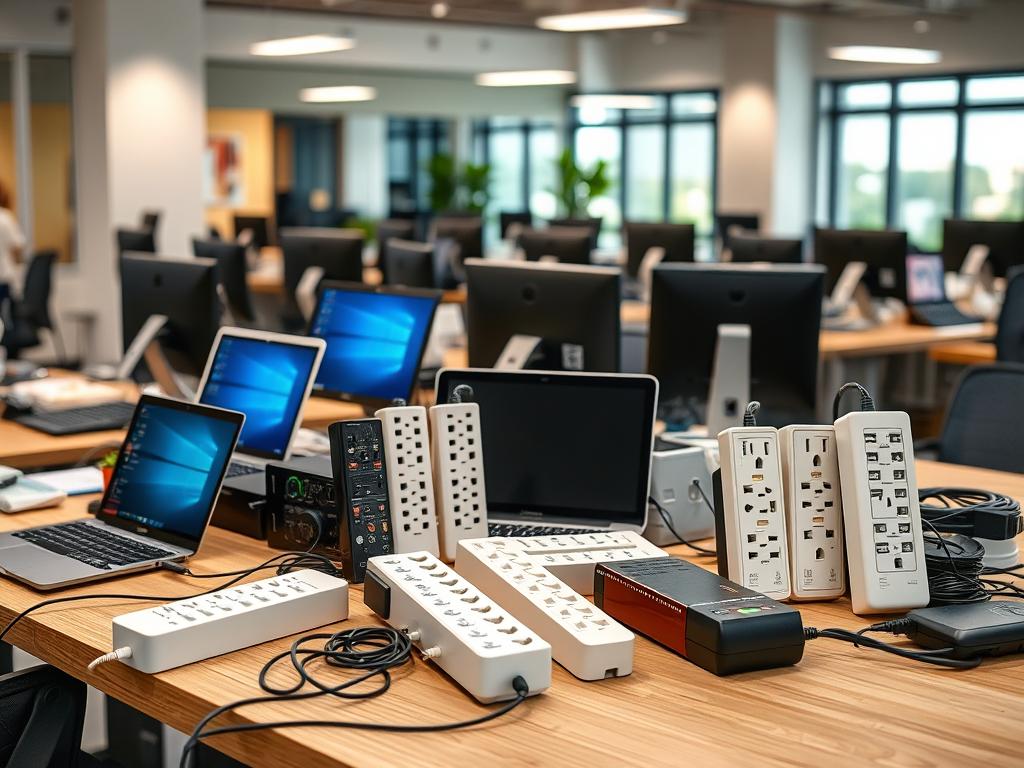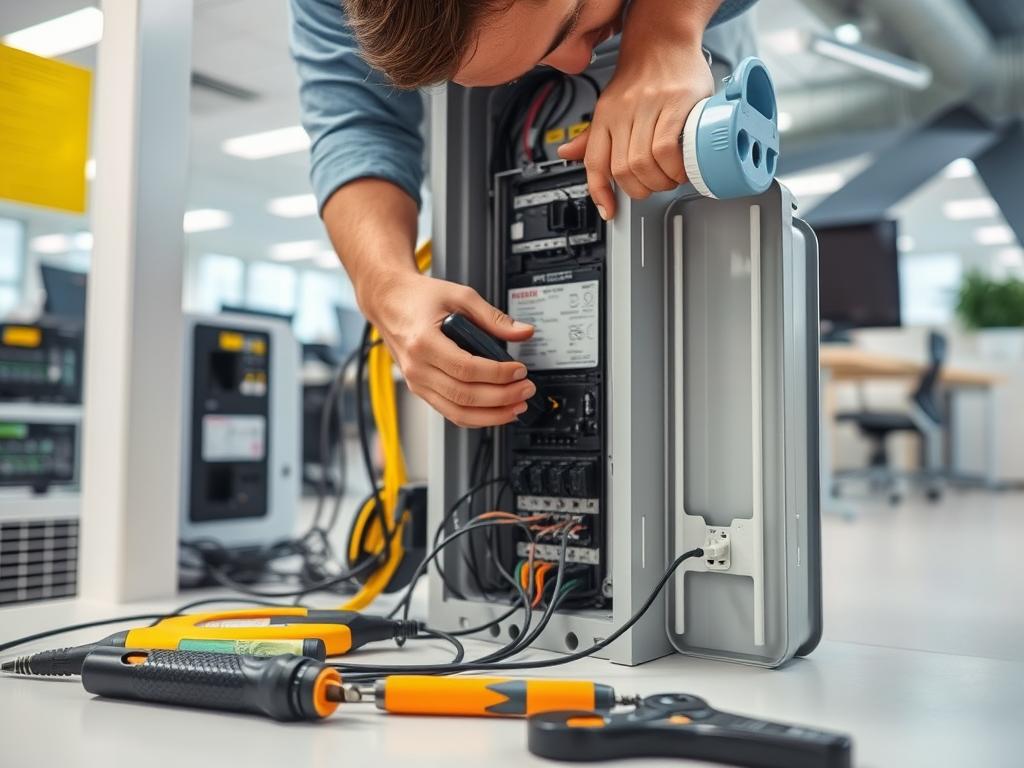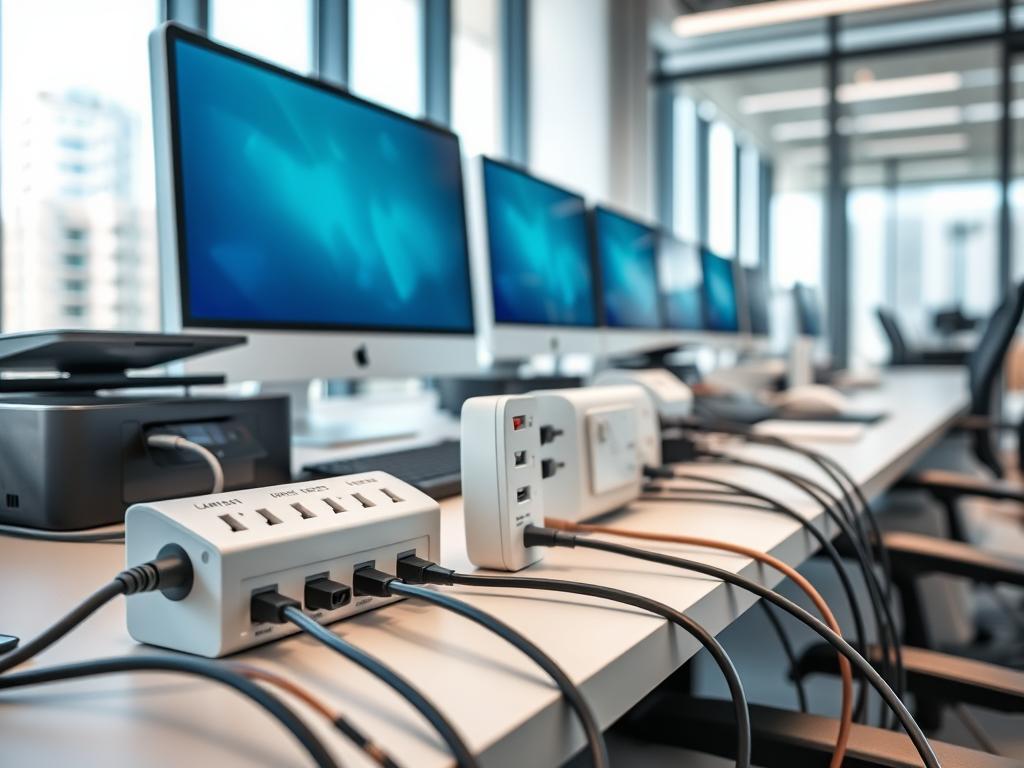I remember a day when a power surge ruined my office computer. It was a hard lesson on the need for surge protectors. Now, I want to help others avoid this mistake.
Surge protectors are key to keeping office equipment safe. They protect our devices from sudden electrical threats. I’ve seen how a power surge can damage things, so I know how important they are.
Did you know surge protectors usually last three to five years? In areas with unstable power, they might need to be replaced every two years. Knowing this helps keep our office equipment safe.
Not all surge protectors are the same. Some, like those with series-mode tech, block almost all extra voltage and last longer. They act like a tireless bouncer for your electronics. Having them in our workspaces brings peace of mind.
Let’s explore surge protectors together. I’ll share what I’ve learned about keeping our office devices safe. This info is something you’ll want to know!
Understanding Power Surges and Their Impact on Office Equipment
Power surges are a big threat to office electronics. I’ve seen how they can damage valuable equipment. Let’s look at what causes these surges and how they can harm your office gear.
What Causes Power Surges
Power surges come from many sources. Lightning strikes are a big problem, with over 20 million cloud-to-ground strikes in the U.S. each year. Utility issues and sudden shutdowns of office devices can also cause surges. A surge can send 500 to 1,000 volts through cables, much more than the usual 120 volts.
Types of Power Surges: Internal vs External
There are two types of power surges: internal and external. Internal surges happen when big appliances in your office turn on and off. External surges come from outside, like lightning or power grid problems. Both can damage equipment if not managed well.
Potential Damage to Office Electronics
Power surges can really hurt office electronics. Computers, printers, servers, and more are at risk. Surges can cause data loss, equipment failure, or complete breakdown. With claims for lightning damage often over $10,000, good power management is key to protect your office and keep things running smoothly.
Surge Protectors for Offices: Essential Features and Benefits
Surge protectors are vital for keeping your office devices safe. They protect against power spikes. Let’s look at the important features they offer.
The auto-shutoff function is a key feature. It turns off when the protector can’t handle more power. This keeps your devices safe. Also, having many outlets is important. It lets you protect several devices at once.
High joule ratings are crucial for safety. A higher rating means the protector can handle more energy. For basic protection, look for at least 600 joules. For expensive electronics, go even higher.
Surge protectors offer many benefits. They protect against power spikes, making your devices last longer. This saves you money by avoiding costly repairs.
When picking a surge protector, check for UL or ETL ratings. These ensure the protector works well. Remember, surge protectors need to be replaced often to keep your devices safe.
Types of Surge Protectors Available for Business Use
Choosing the right surge protector is key for business electrical safety. There are many types of surge protectors for different office needs. Let’s look at the options for effective office surge protection.
Power Strip Surge Protectors
Power strips with surge protection are great for many devices. They offer 1,000 joules of protection, perfect for computers and audio/video gear. They’re simple to use and protect your office electronics well.
Wall-Mount Protection Systems
Wall-mount protectors are perfect for small spaces. They plug into outlets, saving space. They’re ideal for protecting individual workstations or small groups of equipment.
Whole-Building Surge Protection
Whole-building systems offer the best protection. They’re installed at the main electrical panel. This is important because insurers paid over $900 million in lightning claims in 2019.
Rack-Mounted Solutions
Rack-mounted surge protectors are for server rooms and data centers. They protect sensitive equipment well. These units often have features like remote monitoring.
| Surge Protector Type | Best For | Protection Level |
|---|---|---|
| Power Strip | Office desks, multiple devices | Medium |
| Wall-Mount | Space-constrained areas | Medium |
| Whole-Building | Entire office protection | High |
| Rack-Mounted | Server rooms, data centers | Very High |

Key Specifications to Consider When Choosing Office Surge Protection
Choosing the right surge protector for office equipment is key. Let’s look at the important specs to pick the best for your business.
Joule Ratings Explained
Joule ratings show how much energy a surge protector can handle. For office gear, look for surge protectors with 2000 joules or more. This ensures your computers, printers, and other devices are well-protected.
Clamping Voltage Requirements
Clamping voltage is when a surge protector starts to block extra energy. A lower clamping voltage means better protection. For office equipment, aim for a clamping voltage between 330 to 400 volts.
Response Time Importance
Quick response time is crucial to minimize surge impact. Choose surge protectors that react fast, in nanoseconds. This keeps your office equipment safe from sudden power spikes.
| Specification | Recommended Value for Office Use |
|---|---|
| Joule Rating | 2000+ joules |
| Clamping Voltage | 330-400 volts |
| Response Time | Nanoseconds |
| Safety Certification | UL Listed or ETL Certified |
Investing in a good surge protector saves money by preventing damage to your office equipment. Brands like APC, Belkin, and Tripp Lite offer reliable options. They come with strong warranties, giving you peace of mind for your business electronics.
Safety Guidelines and Best Practices
Office electrical safety is very important. Surge protection keeps your space safe and your gear working well. The National Electrical Code (NEC) updates its rules since 2002. The 2023 version has clear surge protection rules for different places.
Following safety rules can really help. Always use surge protectors in dry, indoor spots. Don’t go over their electrical limits or use them with water devices. Before plugging in, make sure cords are fully uncoiled. It’s also good to keep surge protectors visible and not covered.
Some tips I’ve learned include checking surge protector lights often. Avoid using too many extension cords at once. This can overload your system. Keep kids and pets away from these devices to avoid accidents. About 80% of electrical surges come from inside your office, so good protection is essential.
| Surge Protection Type | Description | Cost Range |
|---|---|---|
| Service Entrance Equipment | Whole-building protection | $500 – $6500 |
| Data Line Protection | Safeguards network equipment | $25 – $150 |
| AC Receptacle Protection | Point-of-use surge protection | $25 – $150 |
By following these safety steps and surge protection tips, you’ll protect your equipment and make your work place safer. It’s not just about following rules. It’s about keeping your business safe and everyone safe too.
Installation and Maintenance of Office Surge Protectors
I know how important surge protector maintenance and office equipment care are for businesses. Proper installation and upkeep of surge protectors can save you from costly repairs and downtime.
Proper Installation Techniques
When installing surge protectors, I always plug them directly into grounded outlets. This ensures maximum protection for your devices. I also check the orientation to guarantee optimal performance.
Regular Maintenance Schedule
I recommend a quarterly maintenance routine for your surge protectors. This includes checking indicator lights, inspecting for physical damage, and testing the device’s functionality. Here’s a breakdown of key maintenance tasks:
| Task | Frequency | Description |
|---|---|---|
| Visual Inspection | Monthly | Check for cracks, burns, or loose connections |
| Status Light Check | Quarterly | Ensure green light is on; absence indicates issues |
| Clamping Voltage Test | Annually | Use multimeter to verify 330V-500V range |
| Cleaning | Semi-annually | Remove dust with compressed air, avoid moisture |
When to Replace Protection Devices
I typically replace surge protectors every 3-5 years. In areas with frequent power issues, more frequent replacement might be necessary. If you notice any signs of wear, damage, or if the protection indicator light is off, replace the device immediately.

Remember, proper surge protector maintenance is key to effective office equipment care. By following these guidelines, you’ll ensure your devices stay protected and your business runs smoothly.
Common Misconceptions About Surge Protection in Offices
I’ve seen many myths and misconceptions about surge protectors in offices. Let’s set the record straight on some common beliefs.
Many think all surge protectors are the same. But, they’re not. They have different joule ratings, showing how much energy they can handle. For high-end office gear, look for a surge protector with at least 2,000 joules.
Some confuse power strips with surge protectors. Not all power strips protect against surges. Always check the specs before trusting a device to keep your office electronics safe.
Many believe surge protectors never need to be replaced. But, they do wear out and should be swapped out every 2 to 3 years. Or after a big power surge. Not replacing them can leave your equipment open to power spikes.
| Myth | Reality |
|---|---|
| All surge protectors are equal | Joule ratings vary, affecting protection level |
| Power strips always protect against surges | Not all power strips include surge protection |
| Surge protectors last indefinitely | Need replacement every 2-3 years |
| Lightning protection is guaranteed | Surge protectors can’t withstand direct strikes |
Knowing these truths helps you make better choices to protect your office gear. Remember, good surge protection is key to a safe and productive work space.
Advanced Features for Modern Office Environments
In today’s fast-paced offices, smart surge protection does more than just protect against power spikes. I’ve noticed a big need for devices that do more than just control voltage. Let’s look at some top features that are changing how we manage office energy.
Smart Connectivity Options
Now, smart surge protectors work well with office automation systems. You can control them with apps on your phone or with voice assistants. This makes managing power easier and helps the office run better.
Remote Monitoring Capabilities
Being able to watch your energy use in real-time is a big deal. Advanced surge protectors send alerts about power problems to your device. This lets you fix issues fast, keeping your equipment safe and running smoothly.
Energy Management Features
Today’s surge protectors also help save energy. They can turn off devices that are not being used, saving energy. Some even give detailed reports on how much power you’re using, helping you use less.
| Feature | Benefit |
|---|---|
| Smart Connectivity | Remote control and integration with office systems |
| Remote Monitoring | Real-time alerts and status updates |
| Energy Management | Reduced power consumption and detailed usage reports |
These advanced features in smart surge protection devices are changing how we manage office energy. They not only keep your equipment safe but also help make your office more efficient and cost-effective.
Device Safety: Offices are filled with devices that can easily get tangled and damaged. Surge protectors are crucial in protecting against electrical surges. They absorb or divert excess energy, preventing damage to computers, phones, and servers. This keeps your office running smoothly during power outages.
Electrical Protection: Offices have many devices plugged into the same outlets, creating electrical hazards. Surge protectors offer the best protection by safely directing excess energy away from devices. This prevents damage, reduces downtime, and keeps your office safe.
Safety Features: When buying surge protectors, look for features like overload protection and arc fault detection. These features add an extra layer of security against electrical hazards. They ensure your devices are safe from power surges or spikes.
Types of Surge Protectors: There are many types of surge protectors, from USB to server-grade. Choose one that fits your office needs. Consider power rating, connectivity options, and energy efficiency. The right surge protector keeps your equipment safe and your business running smoothly.
Benefits of Surge Protectors: Surge protectors offer more than just device safety. They reduce downtime, increase energy efficiency, and boost productivity. They absorb excess energy and prevent damage, minimizing disruptions. Many modern surge protectors also have monitoring and alert features.
Conclusion
I’ve looked into why office surge protection and keeping devices safe is so important. Surge protectors are more than just extras. They are key to protecting our office gear. Since 97% of power surges come from things other than lightning, we really need good protection.
When picking a surge protector, it’s important to know about joule ratings and clamping voltage. UL says a clamping voltage of at least 330 volts is good. But 120 volts is even better for the best protection. Also, a higher joule rating means the protector can handle more surges, keeping your devices safe.
It’s also key to install and maintain surge protectors right. You can choose from power strip surge protectors or whole-house systems. Make sure they’re set up right and checked often. This way, we can lower the chance of damage and save money, showing how vital surge protection is in today’s offices.
FAQ
What are power surges and how do they affect office equipment?
How do surge protectors work to safeguard office devices?
What are the key features to look for in an office surge protector?
What types of surge protectors are available for business use?
What do joule ratings mean in surge protectors?
What are some safety guidelines for using surge protectors in the office?
How often should office surge protectors be replaced?
Are all power strips the same as surge protectors?
What advanced features are available in modern surge protectors for offices?
Can surge protectors safeguard against all types of electrical issues?
Source Links
- https://www.nytimes.com/wirecutter/reviews/best-surge-protector/ – The Best Surge Protector
- https://www.cnet.com/home/kitchen-and-household/best-surge-protector/ – Best Surge Protector of 2024
- https://www.popularmechanics.com/technology/gadgets/g3062/best-power-strips/ – Safeguard Your Electronics With These Power Strips and Surge Protectors
- https://www.sollatek.com/surge-protection-guide/ – Surge Protection: The Essential Guide 2024 | Sollatek
- https://www.nationwide.com/lc/resources/small-business/articles/power-surge-protection – Commercial Power Surge Protection – Nationwide
- https://mackeyservicestx.com/how-surge-protectors-work-and-their-many-benefits/ – How Surge Protectors Work and Their Many Benefits | Mackey
- https://www.ul.com/insights/guide-power-strips-and-surge-protectors – Guide to Power Strips and Surge Protectors
- https://www.lenovo.com/us/en/glossary/surge-protectors/?srsltid=AfmBOoohL0SipWeXkO6ce6LPZ0LMPqbviah_kGw8KsJUG2N-ZneRsJmo – What are Surge Protectors & Why You Need Them
- http://www.rockfordmutual.com/blog/4-types-surge-protectors-consider-your-business – 4 Types of Surge Protectors to Consider in Your Business
- https://assets.tripplite.com/white-paper/how-to-choose-the-right-surge-protector-white-paper-en.pdf – How to Choose the Right Surge Protector
- https://www.cdw.com/content/cdw/en/articles/hardware/how-to-choose-a-surge-protector.html – How to Choose a Surge Protector
- https://thorsurge.com/en/Blog/6-Key-Considerations-When-Buying-Surge-Protectors – 6 Key Considerations When Buying Surge Protectors | Thor
- https://www.sslshopper.com/reviews/products/best-surge-protectors/ – The Ultimate Guide to the Best Surge Protector of 2024: Protect Your Devices Like a Pro – SSL Shopper Product Reviews
- https://www.diteksurgeprotection.com/understanding-the-2023-nec-rules-for-surge-protection/ – Understanding the 2023 NEC Rules for Surge Protection
- https://www.hanover.com/businesses/business-customer-resources/hanover-risk-solutions/guidelines-providing-surge-protection – Guidelines for providing surge protection devices (SPDs) at commercial, institutional, and industrial facilities
- https://thorsurge.com/en/Blog/5-Steps-To-Maintain-You-Surge-Protector – 5 Steps To Maintain Your Surge Protector | Thor
- https://suburbanenterprises.com/how-surge-protection-works-a-comprehensive-guide/ – How Surge Protection Works: A Comprehensive Guide
- https://tripplite.eaton.com/products/power-surge-protectors-explained – Surge protectors explained | Eaton
- https://austere.com/blogs/life-style/misconception-all-surge-protectors-provide-the-same-level-of-protection?srsltid=AfmBOooXPBlWG0Gjt_ehqNtvReWKw92bQViEvNcNzlNQNFFSgsM5trVD – Misconception: All Surge Protectors Provide the Same Level of Protection
- https://thorsurge.com/en/Blog/5-Common-Myths-About-Surge-Protection – 5 Common Myths About Surge Protection | Thor
- https://primewirecable.com/blogs/news/5-surge-protection-myths-things-you-should-know – 5 Surge Protection Myths – Things you should know
- https://thorsurge.com/en/Blog/5-Key-Features-of-Surge-Protector-Devices – 5 Key Features of Surge Protector Devices | Thor
- https://www.cyberpower.com/de/en/product/series/professional – No title found
- https://www.cablematters.com/Blog/Power/surge-protectors?srsltid=AfmBOopxSeuGjxc97dMN362C6xazJ8IrwpmwCgdtTau78gQCqUGRgreu – Surge Protectors: What Are They and Do You Need One? | Cable Matters Blog
- https://amtrustfinancial.com/blog/loss-control/business-power-surge-protection – Power Surge Protection for Businesses | AmTrust Financial
- https://chintglobal.com/blog/surge-protection-devices-pros-cons/ – Surge Protection Devices: Pros and Cons
